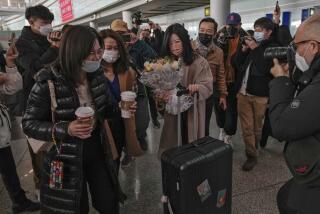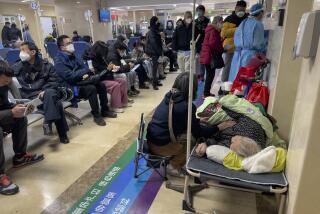As Toll Rises, Asia Tries to Control SARS
- Share via
BEIJING — SARS continued to spread across Asia on Friday, with the report of 13 deaths and the quarantining of thousands more people under a slew of harsh measures enacted to control the disease.
Early today, authorities in Singapore reported the 20th SARS death in the city-state, which has been hard-hit by the disease.
On Friday, Beijing officials closed a third hospital, shuttered two college dormitories and tried to halt the mass migration of laborers and students back to their homes in the provinces. Taiwan sealed off a hospital where more than 25 new cases of the disease were discovered. Shanghai braced for a possible sharp increase in reported cases as authorities there adopted World Health Organization standards for defining them. And the Philippine government passed sweeping measures empowering the health minister to establish and enforce quarantines.
On the opposite side of the globe, WHO turned a deaf ear to entreaties from Toronto, refusing to lift a warning issued Wednesday against unnecessary travel to the Canadian city. “There will be no suspension for Toronto,” WHO spokeswoman Christine McNab said Friday in Geneva.
A WHO official in Shanghai predicted that the outbreak could become much worse if it spreads into China’s rural provinces and into such densely populated nations as Bangladesh where medical facilities are lacking.
“There will be various countries in the world where we would be really concerned because we don’t think they have the capacity to stem the tide once it is introduced,” Wolfgang Preiser said.
As of Friday, WHO had reported 4,649 cases of severe acute respiratory syndrome worldwide, with 276 deaths. Mainland China and Hong Kong accounted for 4,111 cases and 230 deaths. Canada has seen 140 probable cases and 18 deaths. The United States has 37 probable cases and no deaths.
Beijing police Friday taped off the 500-bed Ditan Hospital, one of the city’s main facilities for infectious diseases, although some medical workers were allowed to leave the building. An unknown number of SARS patients were quarantined in the hospital, where Foreign Ministry officials had organized a tour for foreign journalists less than two weeks ago.
In western Beijing, authorities shut down dormitories at the Central University of Finance and Economics and the Northern Transportation University, sealing hundreds of residents inside, state media reported.
SARS has killed 42 and infected 870 of Beijing’s 13 million people. On Friday, Beijing authorities ordered 4,000 residents who had “intimate contact” with people with SARS symptoms to remain at home for 10 days.
In the Philippines, government officials acknowledged for the first time Friday that SARS was spreading through the country. Health Secretary Manuel Dayrit said two people have died -- a nursing assistant who contracted the disease in Toronto and her father. Two other SARS cases were confirmed.
President Gloria Macapagal Arroyo designated Dayrit the “SARS czar,” ordering him to “contain, control, prevent and restrict” the disease’s spread. New measures also gave the police power to impose and maintain quarantines.
In Taiwan, authorities sealed off the Taipei Municipal Ho Ping Hospital on Thursday after discovering more than 25 suspected SARS cases. More than 1,000 medical staff and patients will be quarantined in the hospital for up to two weeks.
In Hong Kong, authorities announced six new deaths from SARS, raising the territory’s toll to 115. The dead included a 42-year-old woman and a 35-year-old man, both of whom had been in good health before catching the virus that causes SARS.
The latest figures came as residents inched cautiously toward a more normal routine. In the central districts of Hong Kong, noticeably fewer people were wearing protective masks, restaurants had more tables full, and traffic was heavier than in previous days.
Still, a former director of the U.S. Centers for Disease Control and Prevention, visiting the territory Friday, warned that SARS will likely remain a fact of life in Hong Kong for years.
Speaking at Hong Kong University, Jeffrey P. Koplan of Emory University said containing the virus was a more realistic goal than eradicating it.
“To think that, magically, this government or any other government or any scientist in the world could stop this like you stop a car at a stop sign is very unrealistic,” Koplan said.
SARS is characterized by fevers, coughing and lung congestion, which makes breathing difficult. It is caused by a newly identified coronavirus, a distant cousin of the viruses that cause many common colds. Researchers believe the virus was passed from animals to humans in southern China’s Guangdong province.
In Beijing, Vice Premier Wu Yi, who is tipped to replace recently fired Health Minister Zhang Wenkang, announced a raft of emergency measures to the legislature, including $422 million to construct a new national public health network. The legislative moves came as mainland China reported five deaths Friday.
China’s Cabinet, meanwhile, issued a notice aimed at stopping migrant workers and students from fleeing the capital and possibly transporting SARS to their hometowns. Universities should “persuade” students from leaving their campuses, the notice said, and employers “must not send migrant workers back to their hometowns” or allow large groups of migrants to disperse into society.
But the exodus of Beijing’s migrant population continued Friday, despite signs of tapering off. At the railway station, clusters of men and women sat on their luggage, waiting for trains or tickets.
“It’s not that business hasn’t been good,” a 34 year-old interior decorator who gave his last name as Liu said as he prepared to return to his home in eastern China’s Anhui province. “We just don’t feel it’s safe to go out, and it’s hard to even buy food and vegetables.”
Outlining the government’s strict new policies of monitoring, reporting and quarantining of SARS patients, government spokesman Cai Fuchao pledged that officials “would not let a single case slip by.”
Some of the measures included surveillance and mobilization tactics left over from the Maoist era. In Beijing’s Shaoyaoju neighborhood, a local committee put up posters instructing Communist Party members to report suspected SARS patients for authorities to quarantine.
The committees’ red armband-wearing elderly men and women are nominally the lowest level of municipal government, enforcing birth-control policies and sitting on the street watching the comings and goings of residents and strangers.
In apparent conflict with the Cabinet order not to evict migrants, the posters also gave non-Beijing residents three days to return to their hometowns or be forcibly removed by police.
“The Chaoyang district government issued a notice saying that during this emergency, it would be best for out-of-towners to leave for a while,” explained the vice head of the Shaoyaoju neighborhood committee, who gave his surname as Dong. “It’s for their own safety.”
Asked about Beijing’s recently dismissed mayor, Meng Xuenong, Cai stuck to the language of the party’s official verdict, repeating that the party recognized Meng’s contribution to Beijing’s development but decided to “adjust” the city’s leadership out of stability concerns.
The party’s verdict contrasts with the severe punishment that China’s leaders have threatened for rank-and-file officials who intentionally underreport SARS cases.
*
Special correspondent Kuhn reported from Beijing and Times staff writers Marshall from Hong Kong and Maugh from Los Angeles. Researcher Guo Hui in The Times’ Beijing Bureau contributed to the report.
More to Read
Sign up for Essential California
The most important California stories and recommendations in your inbox every morning.
You may occasionally receive promotional content from the Los Angeles Times.










